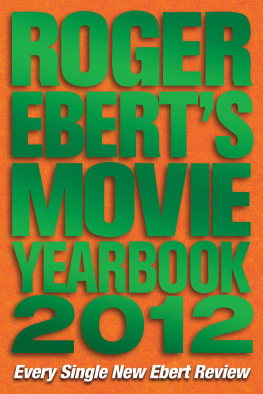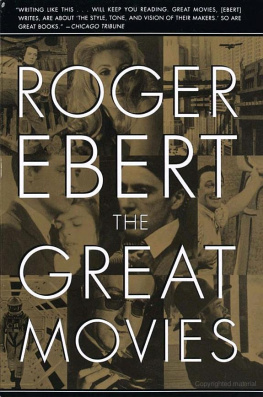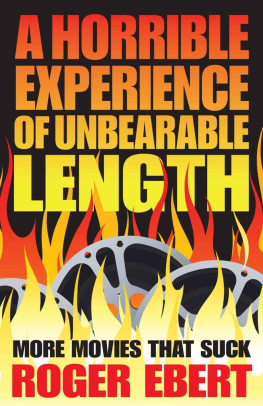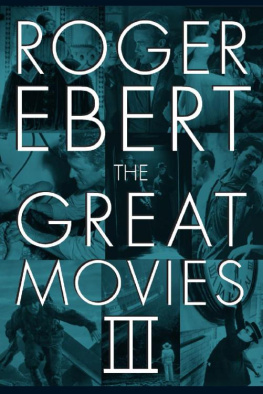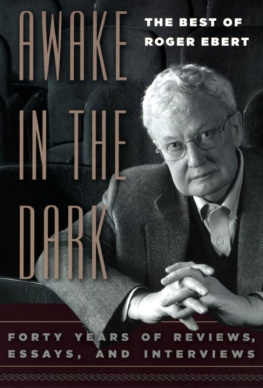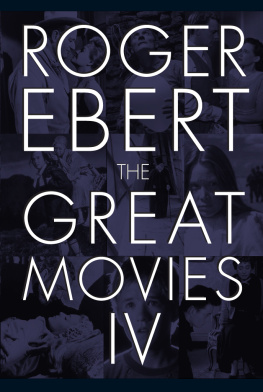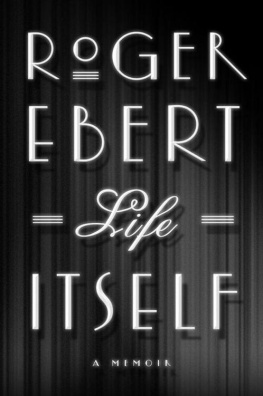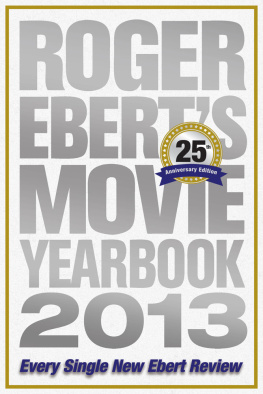Roger Eberts Movie Yearbook 2012 copyright 1999, 2000, 2001, 2002, 2003, 2004, 2005, 2006, 2007, 2008, 2009, 2010, 2011 by Roger Ebert. All rights reserved. No part of this book may be used or reproduced in any manner whatsoever without written permission except in the case of reprints in the context of reviews.
Andrews McMeel Publishing, LLC
an Andrews McMeel Universal company
1130 Walnut Street, Kansas City, Missouri 64106
www.andrewsmcmeel.com
E-ISBN: 978-1-4494-2150-2
APPR
Library of Congress Control Number: 2011926181
All the reviews in this book originally appeared in the Chicago Sun-Times.
ATTENTION: SCHOOLS AND BUSINESSES
Andrews McMeel books are available at quantity discounts with bulk purchase for educational, business, or sales promotional use. For information, please e-mail the Andrews McMeel Publishing Special Sales Department:
ROGER EBERT is the Pulitzer Prizewinning film critic from the Chicago Sun-Times, and the only film critic with a star on the Hollywood Walk of Fame. He was voted an honorary member of the Directors Guild of America, and was given the American Society of Cinematographers Lifetime Achievement Award. His annual film festival, Ebertfest, which is organized by the University of Illinois, is in its fourteenth year. His Web site, rogerebert.com, receives more than 105 million visits a year.
Other Books by Roger Ebert
An Illini Century
A Kiss Is Still a Kiss
Two Weeks in the Midday Sun: A Cannes Notebook
Behind the Phantoms Mask
Roger Eberts Little Movie Glossary
Roger Eberts Movie Home Companion annually19861993
Roger Eberts Video Companion annually19941998
Roger Eberts Movie Yearbook annually19992007, 2009
Questions for the Movie Answer Man
Roger Eberts Book of Film: An Anthology
Eberts Bigger Little Movie Glossary
I Hated, Hated, Hated This Movie
The Great Movies
The Great Movies II
Your Movie Sucks
Roger Eberts Four-Star Reviews19672007
Awake in the Dark: The Best of Roger Ebert
Scorsese by Ebert
With Daniel Curley
The Perfect London Walk
With Gene Siskel
The Future of the Movies: Interviews with Martin Scorsese, Steven Spielberg, and George Lucas
DVD Commentary Tracks
Citizen Kane
Dark City
Casablanca
Floating Weeds
Crumb
Beyond the Valley of the Dolls
Key to Symbols
| A great film |
| A good film |
| Fair |
| Poor |
| G, PG, PG-13, R, NC-17: Ratings of the Motion Picture Association of America |
| G | Indicates that the movie is suitable for general audiences |
| PG | Suitable for general audiences but parental guidance is suggested |
| PG-13 | Recommended for viewers 13 years or above; may contain material inappropriate for younger children |
| R | Recommended for viewers 17 or older |
| NC-17 | Intended for adults only |
| 141 m. | Running time |
| 2010 | Year of theatrical release |
 | Refers to Questions for the Movie Answer Man |
Reviews
A
Accomplices
NO MPAA RATING , 93 m., 2010
Gilbert Melki (Herve Cagan), Emmanuelle Devos (Karine Mangin), Cyril Descours (Vincent Bouvier), Nina Meurisse (Rebecca Legendre), Joana Preiss (Esther). Directed by Frederic Mermoud and produced by Damien Couvreur and Tonie Marshall. Screenplay by Mermoud and Pascal Arnold.
Accomplices coils through two stories, cutting between them as they converge, as we know they will, because the film has opened with a corpse floating in the river Seine. This body, as a flashback establishes, belongs to a boy about nineteen, and the film will watch as he meets a cute girl in a cyber caf and leads her into his dangerous world. The other story involves two police inspectors, who begin with the corpse.
Sometimes when a movie cuts between parallel stories its tiresome. Not this one. The director, Frederic Mermoud, does an interesting thing with time: As the cops are working their way back from the dead body, the other story works its way forward to the point that the body became dead. Then the stories join up and conclude in a surprising and particularly satisfying way.
Vincent (Cyril Descours) is a hustler who meets his male clients in hotel rooms. He meets Rebecca (Nina Meurisse), likes her, gets her phone number, and they start seeing each other. He says he works in real estateunlikely, given his scruffy appearance and the shabby mobile home he lives in. She is bourgeois but ready for the wild side, and they fall truly in love, like Bonnie and Clyde and other couples where crime is in the mix.
Vincent eventually tells Rebecca what he really does, and the way the movie charts her reaction is touchingly realistic. She learns of his world and stirs the jealousy of his pimpor friend, as he considers him. Its thrilling for her to glimpse his outlaw life, and fun when they use prostitution income to pay cash for sneakers.
Herve (Gilbert Melki) and Karine (Emmanuelle Devos) are like a long-established couple, skilled in police work, functioning expertly together, sharing personal feelings. We think its a possibility they might hook up, but the plot isnt that obvious. The film is a police procedural explaining how they begin with a nameless body and find their way back to Vincents associates and clients. One interview, with a businesswoman who shared Vincent with her husband, is startling: The woman is forthcoming, matter-of-fact, defiant.
Without making a big deal out of it, Accomplices puts several plausible murder suspects onstage, including Rebecca, who disappeared the day of Vincents murder. Its like an Agatha Christie in which lots of people have the opportunity and the motive. But Mermoud works so close to the characters, sees them in such detail, that only later do we pull back and observe the workings of the plot.
The original English title of the film was Partners, and that would have been accurate. Its about two partnerships. The one is the sad, doomed story of Vincent and Rebecca, incapable of dealing with the risks they run. The other is about how Herve and Karine shy away from risks in their lonely personal lives; how police routine creates a way for them to spend most of their waking hours together without having to deal with the sleeping hours.
I appreciate the way French films, in particular, often approach their characters at eye level. Theres no artificial heightening. No music pounding out emotional instruction. Theyre cool, curious, looking for performances with the tone of plausible life. All four of these actors are completely natural in front of the camera.
You may have seen Emmanuelle Devos in films such as Read My Lips (2001) or The Beat That My Heart Skipped

